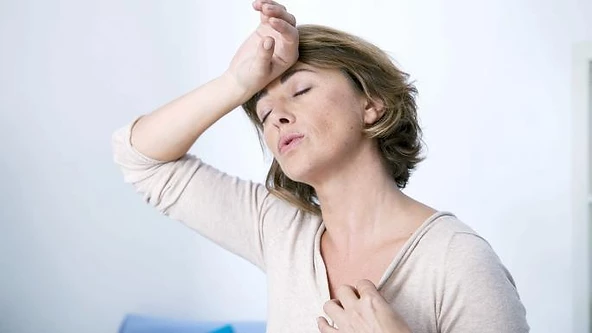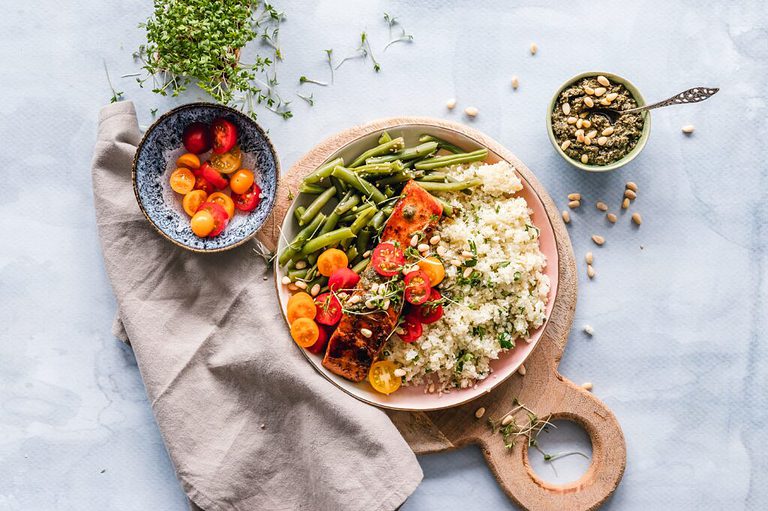Menopause is a process that every woman will experience at some point in their life, whilst we immediately think of the symptoms including hot flushes and mood swings, however, there are nutritional implications for this life stage.
Once again, before I dive in, let’s review what menopause is and what happens to your body during this time before we cover any nutrition business.
What is Menopause?
Menopause is quite simply, a woman’s final menstrual period. This is caused by a shift in sex hormones preventing the ovaries from releasing anymore eggs, which ultimately leads to a drop in the hormones, oestrogen and progesterone (more about this later).
Menopause is the final menstrual period, which on average occurs around age 51.
The average age women reach menopause naturally, is about 45-55 years old. However, for others it may occur prematurely (before 45 years of age) or early (before 40 years of age) due to surgery (e.g. hysterectomy) or cancer treatments or primary ovary insufficiency leading to a spontaneous halt in menstruation.
Perimenopause is the period before you reach natural menopause where your ovaries are starting to run out of eggs, and symptoms are likely to begin for many women. (Source: Jean Hailes for Women’s Health)
What are the Symptoms of Menopause & Perimenopause?
As we are all unique, different women will experience different symptoms of menopause, some may include:
- Hot flushes – experienced by 80% of women, which may cause sleep disturbances
- Memory changes – trouble remembering names, where you put things & phone numbers, with one study showing 62% of women experienced some undesirable memory change during menopause.
- Mood changes – mood swings, feeling tearful, down, anxious or lacking in energy due to a change in hormones, this can be exacerbated if menopause is early or premature or combined with surgery and/or cancer treatments.
- Vaginal changes
(Source: The Royal Women’s Hospital)

What treatments are available to help?
The most commonly thought of treatment for menopause is hormone therapy, formerly known as hormone replacement therapy. Other treatments can include incorporating healthy living, using non-hormonal prescription medications and also seeking mental health support from a psychologist or counsellor can also be helpful during this time.

Speak to your GP and/or gynaecologist about what treatment options are right for you to help manage your unique symptoms and concerns.
Now, onto some common nutrition issues associated with menopause and what you can do to help manage each of these!
Weight Gain
Many women report weight gain around the time of menopause, and tending to shift towards carrying weight more towards their mid-section than their hips, thighs & bottom. Whilst the weight gain itself cannot necessarily be attributed to the hormonal changes (particularly the drop in oestrogen and progesterone), however, this does explain why you are now carrying additional fat stores around the abdomen.
Weight gain associated with menopause is usually due to a number of factors which may differ from woman to woman, but may include: a loss of muscle mass tissue associated with ageing, and therefore a subsequent reduction in our Basal Metabolic Rate (or ability to use energy or “burn calories” at rest), lifestyle changes such as leaving full-time work and therefore the associated routines of preparing meals and/or exercise may also change and move more towards eating out, changes in the types of physical activity may also occur due to other health conditions (e.g. moving away from higher intensity sports or activities towards more gentle exercise such as swimming, walking or yoga).
Eating nutritious foods that you enjoy and moving regularly doing something you love will help you manage weight gain. It is important to avoid fad diets, including cleanses, juices, fasts or any kind of restrictive diet will only be an unsustainable detour that may also impact your metabolism if your energy remains restricted for long periods of time.
Seeking the help of an Accredited Practising Dietitian, to help guide you through menopause and help you reach your nutrient needs and goals is essential for a tailored approach that suits your lifestyle! You may also like to speak with your GP and an Accredited Exercise Physiologist for tailored exercise advice and programming.
Bone Health
Our bones provide the basic structure for our muscles, organs and everything else that’s housed inside our body to “hang” off, if you will. However, we often think about them as unchanging or static, however, our bones are alive and are always changing beyond the time you stop growing during adolescence.
The bones are an important store of calcium, however, your blood requires a small amount circulating amount of calcium to keep your other cells happy (like your muscles), however it is your body’s priority to keep your calcium levels up, which means it will sacrifice your bone mineral for calcium. This can lead to a softening of bones or bones becoming more porous, with an increased risk of fracturing and falls.

Oestrogen is a great at protecting our bones throughout our earlier decades, however as our oestrogen drops with menopause, our bones are no longer protected by this hormone and the inability to build new bone after about age 25. This vulnerability of bone loss is often combined with a loss of muscle mass, which can lead to an increased risk of losing balance and falling, and therefore fractures.
There are several nutrients required to maintain healthy bones:
- Calcium – found in dairy foods or calcium-fortified dairy alternatives (e.g. soy milk) – lactose does help the absorption of calcium in the gut, so is best sourced from dairy, if tolerated.
- Vitamin D – preferably through direct sun exposure for brief periods of time without sunscreen, you can also get small amounts from food such as fortified breakfast cereals, milk, margarine and juices, oily fish, eggs and leaving your mushrooms in the sun to make some of their own vitamin D. It is a fat-soluble vitamin, therefore, requires the presence of oils to enhance its absorption into the body.
- Magnesium – an essential mineral found in many nutritious foods including wholegrains, leafy greens, some fruits and nuts & seeds also contributes to the formation of bone, it also helps your body absorb calcium.
- Vitamin K – another fat-soluble vitamin found primarily in dark leafy green vegetables, think spinach, kale, collard greens and the like it is also found in prunes has also been shown to be important for healthy bones. If you take a blood thinning medication (e.g. warfarin) be sure to check with your dietitian and doctor about increasing your vitamin K intake.
- Sodium – ideally, salt (sodium) should be limited also both added into food during cooking or at the table but mostly from processed foods (sauces, gravy, breads, cereals, crackers & biscuits, snack foods and takeaways). This is because sodium and calcium are not buddies, diets high in sodium mean our ability to absorb calcium is reduced as the kidneys will excrete both sodium and calcium.
Calcium and vitamin D needs increase around menopause to help keep your bones healthy

In terms of your exact requirements, women over the age of 51 years (i.e. post-menopausal), require:
- Calcium: 1300 mg per day or 4 serves of dairy/day (1 serve = 250 mL calcium-rich milk OR 3/4 cup yoghurt, 40 g cheese)
- Vitamin D: 10 mcg per day, more may be prescribed if your blood tests reveal low vitamin D or you have a bone condition.
- Magnesium: 320 mg per day
- Vitamin K: 60 mcg per day
- Sodium: 2000 mg per day
(Source: NRVs)
Shifting Needs
So, as you can see there seems to be a much bigger focus on dairy foods to help protect your bones around the age of menopause, from 2 and half serves to 4 serves per day. However, there is a corresponding decrease in grain intake from 6 serves (equivalent to about 6 slices of bread) to 4 serves per day, which helps to keep the energy balance of the diet in check.
Getting in high-quality sources of protein at main meals throughout the day from dairy, meat, fish, poultry, legumes & beans, eggs and the like will also be important for maintaining and developing lean muscle mass as you age.Make weight-bearing exercise a priority daily, focusing on resistance, balance as well as cardiovascular exercise over the week

What is also important is to remain physically active doing weight-bearing activity (e.g. most activities beside swimming) that loads both your muscles and bones to help maintain muscle mass and prevent and manage osteoporosis. Incorporating resistance training a couple of times per week (even starting with body weight exercises), balance exercises once a week and exercise that gets your heart rate up the other days for about 30 minutes per day is just as important as eating well.
Wait, what about Soy?
Soy foods may be helpful during menopause due to it containing phytoestrogens, a kind of plant version of our oestrogen. It may help mimic oestrogen and bind to some of the oestrogen receptors, therefore reducing the symptoms associated with low oestrogen which occur before and during menopause.

Research in this area is limited, however as there is little harm to eating these foods (and they’re pretty delicious too), then give it a go alongside a healthy diet with adequate nutrition for bone health as well as activity.
Try my Satay Tofu & Edamame Soba Noodle recipe is packed with phytoestrogens!
Top Tips for Eating Well for Menopause
To help manage hot flushes, reduce:
- Caffeine – as this can enhance any feeling of a fast heartbeat that you may experience with a hot flush, it can also increase the body’s calcium losses, limit to 2-3 cups of tea or coffee per day.
- Alcohol – cause that may cause you to feel a bit flushed anyway!
- Spicy foods – for obvious reasons (hot!)

In addition, you can try and incorporate foods rich in phytoestrogens:
- Soy foods, including soy milk, tofu, tempeh, edamame
- Wholegrains such as oats, brown rice, barley
- Legumes & beans such as lentils, chickpeas & kidney beans
(Source: Jean Hailes for Women’s Health)
Resources about Menopause
Some great resources about menopause:
- Jean Hailes for Women’s Health: Menopause – this also includes some informative resources for your partner to help them support you throughout this transitional period of life.
- Jean Hailes Podcast – Explain This: Menopause
- The Royal’s Women’s Hospital
- Menopause & Mental Health
Get to your GP to help you answer your questions about menopause, don’t trust Dr. Google with your health! If you’re wanting to learn how to nourish your body throughout this process, trust an Accredited Practising Dietitian that can help guide you through these changes.







